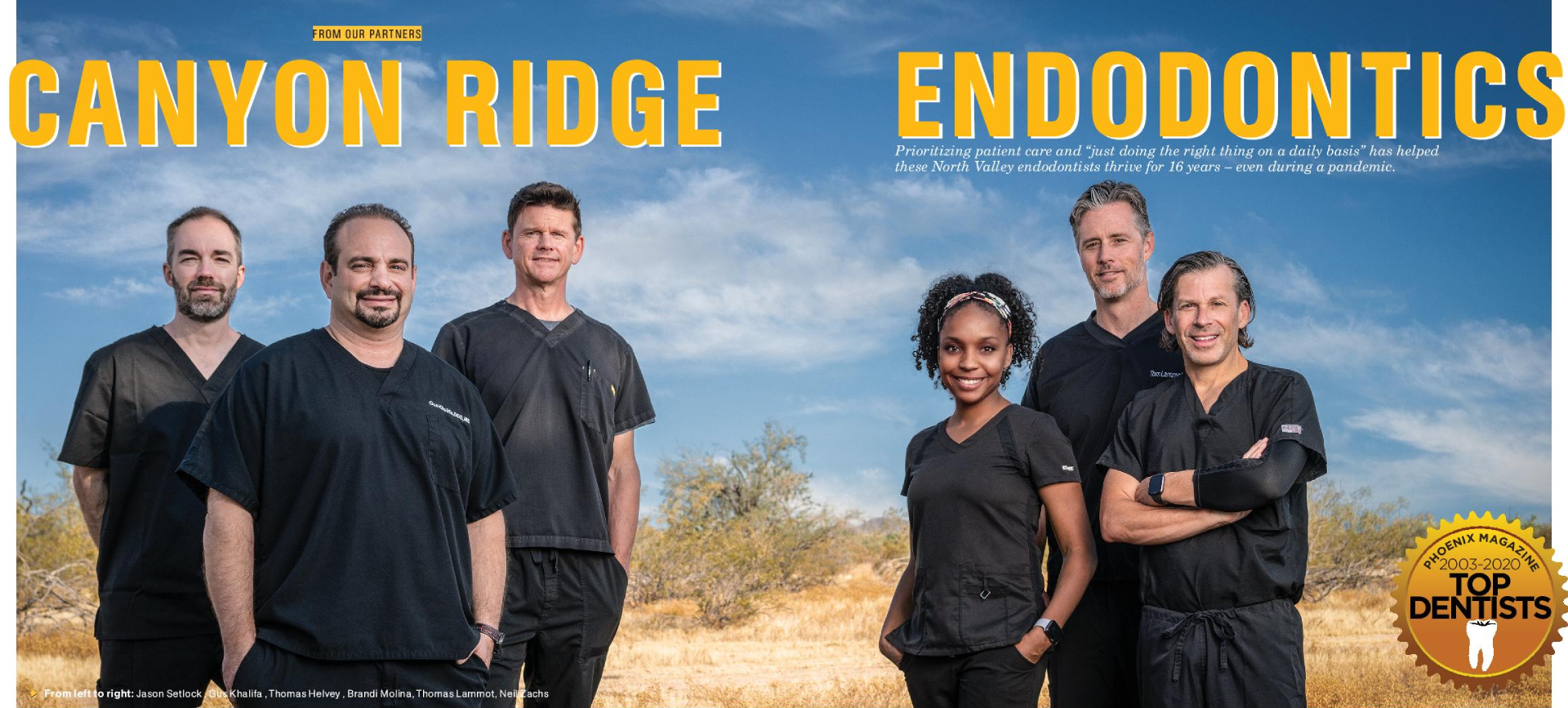
A LOT HAS CHANGED since Dr. Thomas Lammot, D.D.S., and Dr. Gus Khalifa, D.D.S., M.S., started their endodontics practice in 2004. Their enterprise has grown to include five other doctors (including one full-time periodontist) and three locations in North Phoenix and Scottsdale. They’ve weathered the Great Recession and, now, COVID-19. Through it all, one thing has remained constant: dedication to patients. “We’re not a big corporate entity that’s trying to pump patients out,” Lammot says. “We work hard at making sure that everybody still feels like they’re walking in to see somebody they know.” Lammot chatted with us about Canyon Ridge’s care philosophy, pandemic pivots and an exciting new technique for root canals.
WHAT DISTINGUISHES YOUR CARE APPROACH?
We don’t say no. If somebody’s in pain and it’s an emergency, we provide sameday treatment. We get people in and get them taken care of. We don’t just hand you a handful antibiotics and a handshake. We can make a big deal out of a root canal, or just take good care of people. We take most major insurances and have evening hours (at Northern & Scottsdale locations) available because we know people have busy schedules. People respect the fact that we respect their time. It takes a lot of upfront work on our part to make sure that things go smoothly, but it is worth it. We have a good system, and people appreciate that.
HOW HAVE YOU MAINTAINED THAT SYSTEM AS YOU’ VE SCALED YOUR PRACTICE?
It’s about trying to add the right people to the team and making sure that they’re born communicators, not just paperpushers. It’s almost as important as the root canal, that interaction with our staff. There CANYON RIDGE CANYON RIDGE FROM OUR PARTNERS A From left to right: Jason Setlock, Gus Khalifa, Thomas Helvey, Brandi Molina, Thomas Lammot, Neil Zachs PHM0820_022.pgs 07.07.2020 13:25 are some truisms about endodontics: The patient doesn’t want to see us. They’re upset that the general dentist has referred them to somebody that they don’t know. They’re not particularly happy that the root canal is expensive. They’re scared about the shot. We talk to our staff about those kinds of things. “Chances are, they’re probably going to be cranky when they call. It’s your job to really take the time and educate them and be soft with your words and understand where they’re coming from.”
HOW HAVE YOU ADAPTED TO THE CHALLENGES OF COVID-19?
Endodontics is one specialty in dentistry that didn’t shut down during the pandemic. We are sort of primary care frontline health care workers. Now, when a patient walks through the door, we take their temperature before they even sit down. We have a questionnaire about their exposure. We also take the temperatures of our staff members twice a day to make sure that we’re healthy. We have always been good about gloves and masks, but now we’re wearing caps and full gowns. We have fewer chairs in the waiting room, and we ask loved ones to stay in the car rather than come up. As patients walk through the office, somebody follows with heavy-duty Cavicide and wipes handles and chairs after them. Our goal is to have somebody come in and, as quickly as possible, get them back to an operatory where we can control the setting.
ANY INTERESTING NEW TECHNIQUES OR TREATMENTS?
The Gentle Wave is a new way that we do root canals. It’s basically a pressure washer for the inside of the tooth, with a seven-minute cycle that thoroughly cleans that area. It’s a closed-loop system, so it doesn’t create any aerosols, which is a hot topic right now. It’s a $60,000 machine, and we’re not charging extra for the service. We’re just trying to do the right thing, which is something ALL the doctors at CRE has always believed. Just do the right thing on a daily basis, and then the practice is successful. It’s about the patients. That’s really who we are, who we’ve always been.





